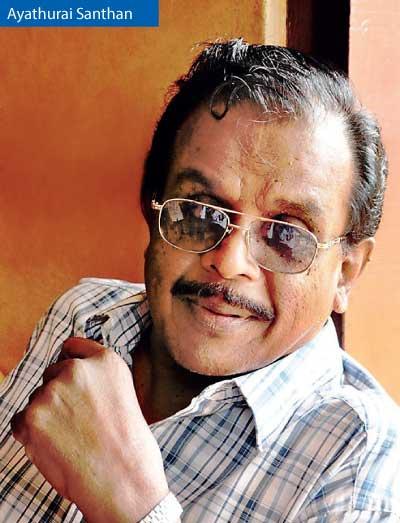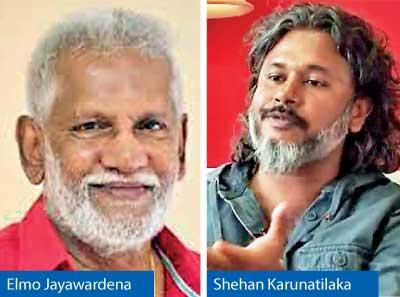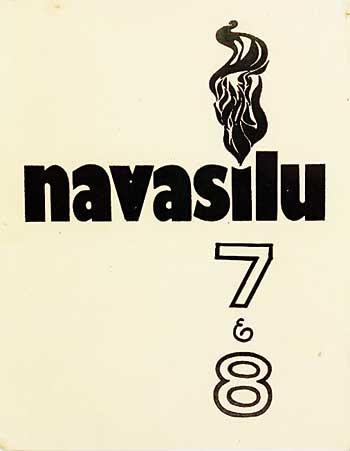Reply To:
Name - Reply Comment
Last Updated : 2024-04-24 22:26:00
In the second half of the 1990s, Sri Lankan English writing began to witness globalization: a new phase where the  arena came to be taken over by writers who, in the past, use Sri Lanka as a winter retreat. These writers published with big, multinational labels, were marketed as if they were titans, and hobnobbed among first world literary lobbies. From Shyam Selvadurai and Romesh Gunasekara in the early to mid-1990s, this brigade of writers grew through the 2000s and 2010s to included notable émigrés like Michael Ondaatje,A. Sivanandan, Karen Roberts, Michelle de Kretser and Roma Tearne. Yet others, like Chandani Lokuge, Manuka Wijesinghe, Nayomi Munaweera and Channa Wickramasekara – in spite of their expatriate status – published with local presses like Perera-Hussein who, in the past decade and a half, accommodated a fair number of expatriate authors.
arena came to be taken over by writers who, in the past, use Sri Lanka as a winter retreat. These writers published with big, multinational labels, were marketed as if they were titans, and hobnobbed among first world literary lobbies. From Shyam Selvadurai and Romesh Gunasekara in the early to mid-1990s, this brigade of writers grew through the 2000s and 2010s to included notable émigrés like Michael Ondaatje,A. Sivanandan, Karen Roberts, Michelle de Kretser and Roma Tearne. Yet others, like Chandani Lokuge, Manuka Wijesinghe, Nayomi Munaweera and Channa Wickramasekara – in spite of their expatriate status – published with local presses like Perera-Hussein who, in the past decade and a half, accommodated a fair number of expatriate authors.
"For socio-historical reasons, Sri Lanka’s English audience is a thin sliver. Unlike the reach of Sinhalese literature, it is in no way a mass audience"
In opposition to the rise of this expatriate department, the 2000s and 2010s experienced a steady decline of Sri  Lanka’s resident/local writer. In spite of their publications being spaced out, up until the first half of the 1990s, Sri Lankan English writing was understood and bench-marked through the work of writers who lived and tread on local soil. In this assessment writers like James Goonewardena, Punyakanthi Wijenaike, and Raja Proctor were the leading novelists between the 1960s and the tail end of the 1980s. In DCRA Goonetilleke’s estimate, Ediriweera Sarachchandra – who made a late arrival in the English scene – was the best of local novelists of that generation. The most notable expatriate novelists of the 1980s were possibly Colin de Silva – who wrote a series of historical novels glorifying medieval kings – and Michael Ondaatje who, having left Sri Lanka as a teenager, was a naturalized Canadian citizen.
Lanka’s resident/local writer. In spite of their publications being spaced out, up until the first half of the 1990s, Sri Lankan English writing was understood and bench-marked through the work of writers who lived and tread on local soil. In this assessment writers like James Goonewardena, Punyakanthi Wijenaike, and Raja Proctor were the leading novelists between the 1960s and the tail end of the 1980s. In DCRA Goonetilleke’s estimate, Ediriweera Sarachchandra – who made a late arrival in the English scene – was the best of local novelists of that generation. The most notable expatriate novelists of the 1980s were possibly Colin de Silva – who wrote a series of historical novels glorifying medieval kings – and Michael Ondaatje who, having left Sri Lanka as a teenager, was a naturalized Canadian citizen.
The setback of the resident writer was brought about by a combination of factors. At one level, the infancy of Sri Lanka’s English publication industry was no match to the globalized first world publication scene that, in the last thirty years or so, hosted our expatriate talent. From the writing of drafts to the nuance of the editorial desk, and from the quality of the final print to the budgets involved in marketing, the expatriate had a head start over her resident cousin. Then came the distribution channels, the accessibility of literary spaces, the breadth of the market, and media visibility. For socio-historical reasons, Sri Lanka’s English audience is a thin sliver. Unlike the reach of Sinhalese literature, it is in no way a mass audience. Within this small enclave – with small reader circles, myopic publishers (who, than building a business, seemed to do the writer a favour by publishing), lack of forums, and the dearth of critical appreciation, the resident writer gradually fell back in the race.
In the submergence of the local writer, the academy, too, had a part to play. Till the 1990s, a notable body of  English creative writing had some connection with the English department, if not with the university. Most writers of the first four decades post-independence, had they not been academics of some degree, had had a university education. From Patrick and Vijitha to Chitra Fernando and from Ashley Halpe and Yasmine Gooneratne to Lakdas Wikkramasinha and Rajiva Wijesinha they were men and women who had linkages with the academy. Even the minor writers of that generation were university-produced. Its gate-keeping aside, the university took a deep interest in the continuation of literary production through journals such as “Ceylon New Writing” and “Navasilu”. This interest is further exemplified by the scholarly work produced by academics on aspects of Sri Lankan writing. Considered an authority of the subject, DCRA Goonetilleke alone has produced an expansive body of critical literature from surveys to appreciations of individual writers. However, post-1990, this situation begins to change in degrees. In the last 20 years, and in preference for alien corn, the academy has palpably turned away from home produce. As places of publication, the distance between Middlesex and Maradana has grown, as has the obliviousness to resident authors rotting in local bookstores.
English creative writing had some connection with the English department, if not with the university. Most writers of the first four decades post-independence, had they not been academics of some degree, had had a university education. From Patrick and Vijitha to Chitra Fernando and from Ashley Halpe and Yasmine Gooneratne to Lakdas Wikkramasinha and Rajiva Wijesinha they were men and women who had linkages with the academy. Even the minor writers of that generation were university-produced. Its gate-keeping aside, the university took a deep interest in the continuation of literary production through journals such as “Ceylon New Writing” and “Navasilu”. This interest is further exemplified by the scholarly work produced by academics on aspects of Sri Lankan writing. Considered an authority of the subject, DCRA Goonetilleke alone has produced an expansive body of critical literature from surveys to appreciations of individual writers. However, post-1990, this situation begins to change in degrees. In the last 20 years, and in preference for alien corn, the academy has palpably turned away from home produce. As places of publication, the distance between Middlesex and Maradana has grown, as has the obliviousness to resident authors rotting in local bookstores.
 The last decade or so has also demonstrated an erosion of critical spaces – from reviews and commentaries in newspapers to features that demonstrate depth. This is clearly visible in the approach to literature and art by newspapers. The inability in an emerging generation of newspaper writers to critique a literary work is alarming. Then, again, the emergence of new media and the takeover of media spaces by audio-visual forms have further diminished the critical engagement with literature and art. A few dinosaurs from a different age continue to write. But, the flourishing features sections that were thorough and well-written merely a decade ago have become things of nostalgia.
The last decade or so has also demonstrated an erosion of critical spaces – from reviews and commentaries in newspapers to features that demonstrate depth. This is clearly visible in the approach to literature and art by newspapers. The inability in an emerging generation of newspaper writers to critique a literary work is alarming. Then, again, the emergence of new media and the takeover of media spaces by audio-visual forms have further diminished the critical engagement with literature and art. A few dinosaurs from a different age continue to write. But, the flourishing features sections that were thorough and well-written merely a decade ago have become things of nostalgia.
"The last decade or so has also demonstrated an erosion of critical spaces – from reviews and commentaries in newspapers to features that demonstrate depth away from home produce.
These are the circumstances of production, reception, and circulation against which a generation of resident writers – among them, Ameena Hussein, Madhubhashini Rathnayake, Lal Medawattegedara, Elmo Jayewardena, Ashok Ferrey, Ayathurai Santhan, Charulatha Thewarathanthri, and Vihanga Perera – have continued to persevere. The vanguard of this line is made by writers like Shehan Karunatilaka, Vivimarie Vanderpoorten, Visakesa Chandrasekaram, and Malinda Seneviratne. They represent a literary practice that stands to benefit from a resuscitation of the local literary  landscape: an atmosphere that encourages local writers overseen by innovative publication – like what Perera-Hussein heralded with their arrival in 2004. This space also needs the academy to play a powerful role, for hard-hitting, nerve-wracking criticism, and people-friendly fora and platforms.
landscape: an atmosphere that encourages local writers overseen by innovative publication – like what Perera-Hussein heralded with their arrival in 2004. This space also needs the academy to play a powerful role, for hard-hitting, nerve-wracking criticism, and people-friendly fora and platforms.
A long overdue creative writing programme for local writers is not beyond our writer-academics. The greater mystery is in its delay; which these writer-academics must share with us, at least in a haiku, if not in detail.
[Note: In the article “Survivor Narratives in National Restoration: The Case of Vanni” published on 12-10-2020 in this space, the name of S. Wimal had been mistakenly acknowledged in place of Sivalingam Anusha as the translator of Sivarasa Karunaharan’s “Mathaka Vanniya”. The writer extends his apologies to both the writer and the translator]

Add comment
Comments will be edited (grammar, spelling and slang) and authorized at the discretion of Daily Mirror online. The website also has the right not to publish selected comments.
Reply To:
Name - Reply Comment
US authorities are currently reviewing the manifest of every cargo aboard MV
On March 26, a couple arriving from Thailand was arrested with 88 live animal
According to villagers from Naula-Moragolla out of 105 families 80 can afford
Is the situation in Sri Lanka so grim that locals harbour hope that they coul